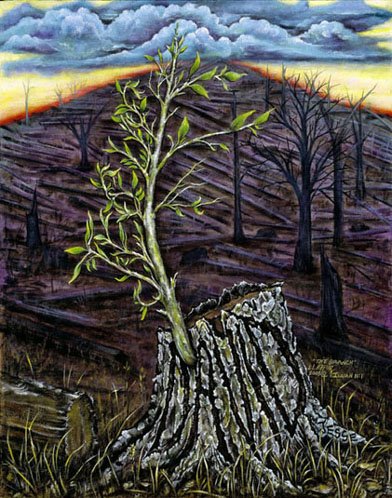INRI
“Behold, the days are coming ... when I will raise up for David a righteous Branch, and he shall reign as king and deal wisely, and shall execute justice and righteousness in the land.”
A subtle depiction of the shoot coming forth from Jesse’s stump, spoken of by the prophets (see esp. Isa 11:1, but the same image echoes in Jeremiah’s “righteous branch” in this week’s reading). We see the devastation and utter desolation in the background of this tender green branch, reaching up towards the heavens, which are filled with clouds that are perhaps promising a gentle rain, or perhaps threatening a storm. The sky is aglow — is it sunrise, or sunset? And the trail of fallen trees — is it a highway leading heavenward? Or a bare and unforgiving mountainway, reaching up towards the clouds? The image is full of dark and ambiguous symbols. There is much that is broken and beyond repair: the background is a landscape of overwhelming destruction. But it is also unmistakably hopeful and recognizably defiant; inviting of new possibilities, and new adventures.
He has delivered us from the domain of darkness and transferred us to the kingdom of his beloved Son, in whom we have redemption, the forgiveness of sins.
— Colossians 1:13-14
Last Sunday after Pentecost - Christ the King
Texts for This Week
Prayer
Almighty and everlasting God, whose will it is to restore all things in your well-beloved Son, the King of kings and Lord of lords: Mercifully grant that the peoples of the earth, divided and enslaved by sin, may be freed and brought together under his most gracious rule; who lives and reigns with you and the Holy Spirit, one God, now and for ever.
Crown him!
Richard Proulx is a contemporary American composer of classic church music. Here is is fine arrangement of DIADEMATA, written in the mid-18th C by George Elvey for the lyrics written by his friend, the cleric Matthew Bridges.



